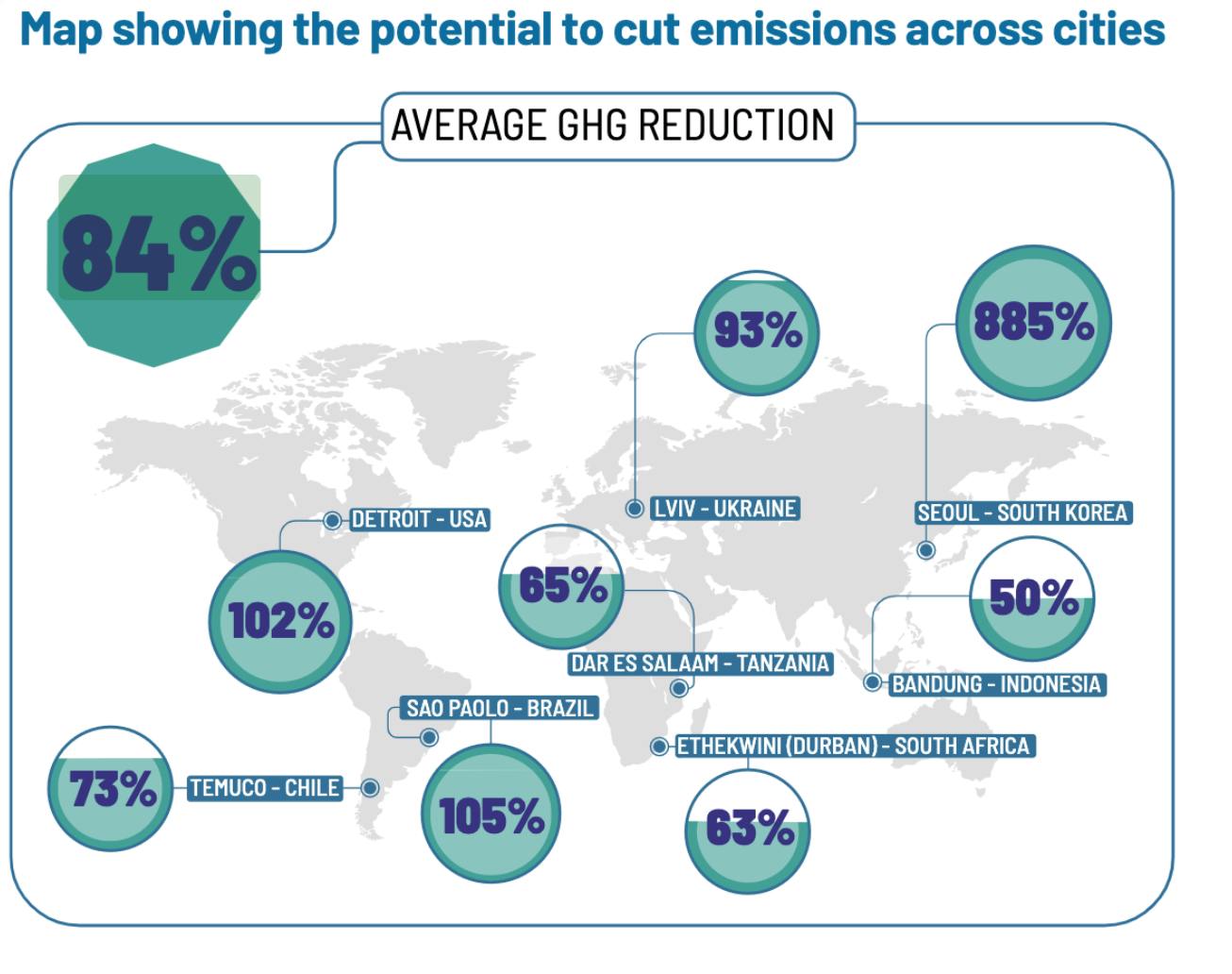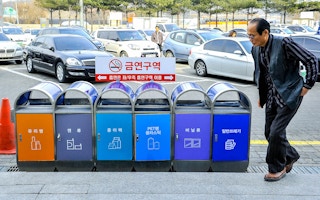Waste reduction solutions like segregation, composting and recycling could cut waste sector emissions by an average of 84 per cent, or more than 1.4 billion tonnes of carbon dioxide, which is equivalent to taking all motor vehicles off the road in the United States for one year, a report by an anti-waste burning advocacy group finds.
To continue reading, subscribe to Eco‑Business.
There's something for everyone. We offer a range of subscription plans.
- Access our stories and receive our Insights Weekly newsletter with the free EB Member plan.
- Unlock unlimited access to our content and archive with EB Circle.
- Publish your content with EB Premium.
“The waste sector is the third largest source of anthropogenic methane emissions, whose reduction will deliver rapid benefits through avoided warming. This [zero waste] approach can reduce flooding, deter disease transmission, improve soil health, and deliver economic opportunities,” read the report released on Tuesday by the Global Alliance for Incinerator Alternatives (GAIA).
Methane, the second most potent climate agitant after carbon dioxide, is estimated to be responsible for 23 per cent of all heating caused by greenhouse gases. Reforming the waste sector could cut global methane emissions by 13 per cent globally, it read.
GAIA’s report modelled potential waste emissions reductions from eight cities around the world, including the South Korean capital Seoul.

Image: Global Alliance for Incinerator Alternatives (GAIA)
Seoul already diverts 96 per cent of its organic waste by source separation where each type of trash is disposed using separate bins or through direct delivery of specific waste types to drop-off facilities. South Korea’s most populous city has “aggressive” methods of separate collection and treatment of organic waste and recycling programmes which can reduce harmful gases, setting it on course to achieve net negative emissions by the end of the decade.
In the past thirty years, its government has mandated households and shops to purchase only designated trash bags. The public is given more incentive to generate less waste because they are asked to pay for waste treatment according to how much they generate.
There is also a free collection mechanism for recyclable waste, encouraging locals to be more active in waste separation and recycling.
However, South Korea’s waste programme is marred by its reliance on incineration, which produces double the volume of greenhouse gases as replacement sources of energy, according to the report.
The east Asian country has also been called out for dumping its garbage on its neighbours. In 2019, the Philippines shipped back 6,500 tonnes of mixed waste to Korea which had been misdeclared as plastic flakes and did not have proper importation permits.
The following year, Philippine customs officials returned to 80 containers of unsorted plastic materials, used dextrose tubes, soiled diapers, discarded electronics and household garbage in violation of national laws and the Basel Convention, which put limits on the international trade in waste.
“Our report advocates strongly for Seoul to stop the harmful practices that are undermining its zero waste goals,” Claire Arkin, GAIA global communications lead, told Eco-Business.
If incineration and illegal waste exportation are phased out, the city could save over 885 per cent of annual emissions by 2030, which is equivalent to the annual emissions from 1.4 natural gas-fired power plants, Arkin added.
Bandung, Indonesia was cited for being the only city analysed which had an action plan to reduce food waste as part of its zero waste model, allowing it to potentially cut its waste emissions by half in seven years.
Its food waste prevention programme collects bruised, unpalatable but still edible food and processes it into pickles and sauces for human consumption. This scheme is critical given that the majority of Bandung’s emissions from the waste sector come from landfilled organic waste, said Arkin.
Globally, a third of all food produced is not eaten, and is responsible for as much as 10 per cent of global greenhouse gas emissions. Tackling food waste could lower up to 5 per cent of global emissions, according to researchers.
Most of these emissions reductions occur in the production and transportation of food even before it reaches consumers, which points to gross inefficiencies in food systems.
Elsewhere, GAIA analysis showed that the city of Detroit in United States and the Ukrainian city of Lviv could lower their waste sector emissions by as much as 102 per cent and 93 per cent, respectively, if they are able to divert organic waste from landfills—their biggest source of methane.
The Russian war in Ukraine made the city of Lviv a major shelter for refugees and hub for humanitarian aid, adding an enormous amount to its waste footprint. But if it continues measures instituted right before the war such as diverting the majority of its organic trash from landfills and pioneering an effort to replace sanitary products, such as diapers and menstrual products, with reusable equivalents, it could improve its emissions dramatically, said the report.
Dar Es Salaam (Tanzania) and Durban (South Africa), which already have efficient informal recycling sectors can each lower harmful gases by more than 60 per cent by introducing waste reduction solutions. Temuco, a remote Chilean city inhabited by mostly indigenous groups, does not have a separate collection system for its recyclables or organic materials, but it has the potential to slash its emissions by 73 per cent by taking the zero waste approach.
Including the waste issue in climate pledges
Despite these findings, more than a quarter of countries’ current climate plans neglect the waste sector, said the report.
Waste management will be a key topic of discussion at the 2022 United Nations Climate Change Conference (COP 27) in November, where host nation Egypt plans to put forward the Africa Waste 50 Initiative, aimed at treating and recycling half of the waste produced in Africa by 2050.
The UN Environmental Assembly (UNEA), also to be held next month, will reconvene in Uruguay to negotiate the world’s first ever treaty on plastic pollution.
“Previous climate talks have largely overlooked the potential of reforms to the waste sector, particularly for reducing methane, which over 100 countries have now pledged to do. Zero waste strategies are the easiest way to rapidly and cheaply bring down emissions, while building climate resilience, creating jobs, and promoting thriving local economies,” said Mariel Vilella, co-author of the report and director of GAIA’s global climate programme.
Vilella added: “As we prepare for another round of UN climate negotiations, we have a unique opportunity to put waste firmly on the agenda. Without concrete commitment from global leaders to zero waste, we will not be able to meet the 1.5° C climate target.”
The COP27 negotiations have already courted controversy by being sponsored by Coca-Cola, a fizzy drinks brand that is routinely ranked as the world’s biggest plastic polluter.










